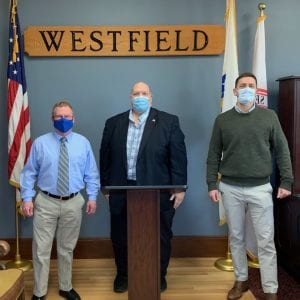WESTFIELD – The City Council rebuffed the Legislative & Ordinance Committee’s request to remove a motion from committee last night, suggesting that further discussion is in order.
Ward 1 Councilor Christopher Keefe requested the council to vote to remove a motion made by former Ward 2 Councilor James E. Brown Jr., regarding the city’s policy of patching holes in the asphalt of roads. Brown’s motion pertained to pavement cuts performed by private contractors and city department to access underground utilities.
The issue was raised by Brown at the council’s Dec. 15, 2011 session because of the extensive excavation of roads between Main and East Silver streets when water and gas utilities were being upgraded as part of the Main Street reconstruction, work that required trenching.
Brown sponsored a motion at that session to establish an ordinance to regulate how the pavement of city streets is cut and repaired, by either city departments or private contractors. Currently, road cuts are repaired with a patch the same size as the pavement cut. The proposed ordinance would require the department or contractor, making the cut, to obtain a city permit and to install curb-to-curb paving at least 10 feet beyond the edges of the pavement cut.
Brown’s motion would have required contractors, and city departments, to repair the pavement by installing new asphalt the entire width of the road and the entire length of the cut, at least 10 feet beyond the pavement, which could be cost prohibitive in some circumstances, in particular when trenching is required to repair, replace or install new water, sewer, drainage, or gas lines which require long pavement cuts.
The L&O’s motion to remove Brown’s proposed ordinance from their committee was rebuffed by several City Council members who feel that the condition of city roads, due to improper or inadequate repair, are deplorable.
Ward 5 Councilor Richard E. Onofrey and At-large Councilor David A. Flaherty both objected to removing the item from committee. Onofrey represents the ward where West Springfield recently installed a new water pipeline from their treatment plant off Shaker Road, near Laro Road, to their community. That project required cutting the pavement of several roads, including Pontoosic and Feeding Hills Road, both of which were repaved prior to the West Springfield water line project.
At-large Councilor John J. Beltrandi III, who is in the real estate and construction business, argued that the city does not need another new ordinance, just enforcement of existing regulation which require contractors and city departments to take out a Department of Public Works permit prior to performing any work in or under city streets.
“People are not taking out that application,” Beltrandi said. “It’s not the pavement, it’s how you compact” the soil as it is returned into the trench or excavation to prevent the pavement from dropping later as the pounding of vehicle tires compacts the soil beneath the patch, causing it to settle below the asphalt patch.
“Compaction is the issue, not the patch,” Beltrandi said. “You can pave 20 feet around the cut, but if it’s not compacted properly, you’ll still end up with a hole in the middle of that pavement. What needs to be addressed is the compaction issue. Ninety percent of road patch failure is due to improper compaction.”
Beltrandi, a contractor, said that many area communities have a performance and inspection requirement as part of the permit.
“There is a trenching fee and contractors are required to give a surety or bond that communities hold for a certain period to make sure the patch doesn’t settle,” Beltrandi said. “Most communities have a permit process which establishes guidelines and inspection requirements that put the contractor on the hook for between 30 and 60 days.”
The discussion then focused on how the DPW can enforce the excavation permit process. Flaherty asked if there is a financial penalty assessed when contractors fail to get the permit. Typically filing fees are not assessed to city department or state agencies, but a fine for failing to get the permit might be assessed to encourage compliance.
The issue was returned to committee for further discussion.
To see last night’s city council meeting, click here.






